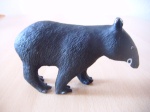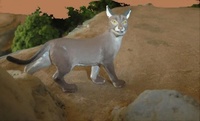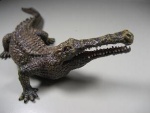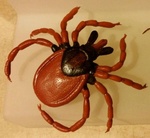| | Mathison Museum of Natural History |  |
|
+15Caracal widukind lucky luke Megaptera rogerpgvg Jill sunny pipsxlch Saarlooswolfhound landrover Kikimalou Taos Duck-Anch-Amun Shanti Saien 19 posters |
|
| Author | Message |
|---|
widukind

Country/State : Germany
Age : 48
Joined : 2010-12-30
Posts : 45745
 |  Subject: Re: Mathison Museum of Natural History Subject: Re: Mathison Museum of Natural History  Sat Feb 25, 2023 3:29 pm Sat Feb 25, 2023 3:29 pm | |
| |
|
  | |
Caracal

Country/State : France
Age : 65
Joined : 2018-10-24
Posts : 7252
 | |
  | |
Roger
Admin

Country/State : Portugal
Age : 50
Joined : 2010-08-20
Posts : 35835
 |  Subject: Re: Mathison Museum of Natural History Subject: Re: Mathison Museum of Natural History  Sun Feb 26, 2023 12:47 am Sun Feb 26, 2023 12:47 am | |
| Since I am in a dog fever, I have to go back and mention that this CollectA boxer is one of my favorite figures. If the Papo Labrador is very good, this Boxer is even better and it is so cool they are made at the same exact scale despite being from different brands. I voted last year the Boxer for dog of the year but surprisingly it got the 3rd place. The equally wonderful Beagle won the contest. I'm curious to see which other breeds will you get, not forgetting there's a Bichon Frisé in your collection too. |
|
  | |
bmathison1972

Country/State : Salt Lake City, UT
Age : 52
Joined : 2010-04-13
Posts : 6710
 |  Subject: Re: Mathison Museum of Natural History Subject: Re: Mathison Museum of Natural History  Sun Feb 26, 2023 12:50 am Sun Feb 26, 2023 12:50 am | |
| - Roger wrote:
- Since I am in a dog fever, I have to go back and mention that this CollectA boxer is one of my favorite figures. If the Papo Labrador is very good, this Boxer is even better and it is so cool they are made at the same exact scale despite being from different brands. I voted last year the Boxer for dog of the year but surprisingly it got the 3rd place. The equally wonderful Beagle won the contest. I'm curious to see which other breeds will you get, not forgetting there's a Bichon Frisé in your collection too.
The only other breed I have now is the CollectA Beagle you mentioned. And I plan on getting the CollectA Rough Collie later this year. The only other one I am currently considering is the recent Safari Great Dane, maybe if I see it in a shop or something. |
|
  | |
Saarlooswolfhound
Moderator

Country/State : USA
Age : 28
Joined : 2012-06-16
Posts : 12056
 |  Subject: Re: Mathison Museum of Natural History Subject: Re: Mathison Museum of Natural History  Sun Feb 26, 2023 4:14 am Sun Feb 26, 2023 4:14 am | |
| If you can't get the Papo dane, I would endorse the Safari. The recent Schleich (for my taste) is too small a scale and has strange looking pouchy lips... I will get one sometime anyhow but its not my favorite representation). Scroll down a bit but you can see it here; [You must be registered and logged in to see this link.]If you can see it in person I think it will sway you.  _________________ -"I loathe people who keep dogs. They are cowards who haven’t got the guts to bite people themselves."-August Strindberg (However, anyone who knows me knows I love dogs [You must be registered and logged in to see this image.] ) -“We can try to kill all that is native, string it up by its hind legs for all to see, but spirit howls and wildness endures.”-Anonymous |
|
  | |
bmathison1972

Country/State : Salt Lake City, UT
Age : 52
Joined : 2010-04-13
Posts : 6710
 |  Subject: Re: Mathison Museum of Natural History Subject: Re: Mathison Museum of Natural History  Sun Feb 26, 2023 1:51 pm Sun Feb 26, 2023 1:51 pm | |
| Species: Graphium deucalion (Boisduval, 1836) Common name(s): yellow zebra About the Figure: Manufacturer: K&M International Series: Wild Republic - Butterflies Nature Tube Year of Production: 2004 Size/Scale: Wingspan 6.5 cm for a scale of 1:1-1:1.2 (slightly under 1:1; see below) Frequency of species in toy/figure form (at time of posting): Unique Miscellaneous Notes: Today's figure is from the same collection as yesterday's monarch! I mentioned yesterday that figures in this set weren't marketed at the species level; elucidating some of the identifications were easy, others were challenging (assuming they were all indeed influenced by actual species). While there was little doubt on the identity of yesterday's model, today's was much more challenging. Graphium deucalion was first proposed by a forum member (Bowhead Whale I believe; I can't remember) and to this day I still think it's be best option. I had difficulty researching the wingspan of this species; the information used to calculate the scale above was provided by websites that sell mounted specimens of G. deucalion. About the Animal: Geographic distribution: Indonesia; several islands in the Sundas and Moluccas, including Sulawesi, Banggai, Biak, Morotai, Halmahera, Ternate, Bacan, and Obi Habitat: Tropical broadleaf forests Diet: Larval diet unknown, but presumed to be plants in the family Aquifoliaceae (holly); adults take nectar from flowers nutrients from mud puddles IUCN Status (at time of posting): Not Evaluated Miscellaneous Notes: I had difficulty researching information on this species, including its wingspan and larval host plants. There appears to be three subspecies of G. deucalion: 1) G. d. deucalion (Sulawesi, Morotai, Halmahera, Ternate, Bacan, Obi); 2) G. d. leucadion (Ternate, Halmahera, Bachan); 3) G. d. marabuntana (Banggai). [You must be registered and logged in to see this image.] |
|
  | |
widukind

Country/State : Germany
Age : 48
Joined : 2010-12-30
Posts : 45745
 |  Subject: Re: Mathison Museum of Natural History Subject: Re: Mathison Museum of Natural History  Sun Feb 26, 2023 4:33 pm Sun Feb 26, 2023 4:33 pm | |
| |
|
  | |
bmathison1972

Country/State : Salt Lake City, UT
Age : 52
Joined : 2010-04-13
Posts : 6710
 |  Subject: Re: Mathison Museum of Natural History Subject: Re: Mathison Museum of Natural History  Mon Feb 27, 2023 1:34 pm Mon Feb 27, 2023 1:34 pm | |
| Species: Megasoma actaeon (Linnaeus, 1758) Common name(s): Actaeon beetle About the Figure: Manufacturer: DeAgostini Series: World Insect Data Book Year of Production: unknown Size/Scale: Body length (including cephalic horn) 10.2 cm, within scale 1:1 for a large major male. Frequency of species in toy/figure form (at time of posting): Uncommon Miscellaneous Notes: This is our fourth look at M. actaeon in the Museum. The DeAgostini insects are cast from actual specimens and are therefore all in the 1:1 range. The figures were sold as premiums with books and come in a plastic display box with their Latin and Japanese names. I am not sure what year the figures were released, and it is possible they were released over multiple years. The original set from Japan consisted of 60 species (59 male Scarabaeoidea and one dragonfly), plus four 'secret' figures representing females of select scarab males. When the set was released in Italy, three of the standard set were replaced with other species, including a leaf insect. Between the two releases and secrets, I think there are 67 figures total representing 63 species. The figures are secured to the base of the box with a small screw, but can be safely removed if one choses to display them outside of the box. About the Animal: Geographic distribution: South America Habitat: Rainforests Diet: Larvae feed in rotting logs, compost, and rich soil; adults are attracted to overripe fruit and sap flows IUCN Status (at time of posting): Not Evaluated Miscellaneous Notes: Large horned dynastine scarab beetles are often named after characters in Greek and Roman mythology. In this case, M. actaeon is named after Actaeon, a famous Theban hero, son of the priestly herdsman Aristaeus and Autonoe in Boeotia, who was trained by the centaur Chiron. [You must be registered and logged in to see this image.] |
|
  | |
widukind

Country/State : Germany
Age : 48
Joined : 2010-12-30
Posts : 45745
 |  Subject: Re: Mathison Museum of Natural History Subject: Re: Mathison Museum of Natural History  Mon Feb 27, 2023 6:17 pm Mon Feb 27, 2023 6:17 pm | |
| |
|
  | |
Caracal

Country/State : France
Age : 65
Joined : 2018-10-24
Posts : 7252
 | |
  | |
bmathison1972

Country/State : Salt Lake City, UT
Age : 52
Joined : 2010-04-13
Posts : 6710
 |  Subject: Re: Mathison Museum of Natural History Subject: Re: Mathison Museum of Natural History  Tue Feb 28, 2023 2:04 pm Tue Feb 28, 2023 2:04 pm | |
| Species: Bitis gabonica (Duméril et al., 1854) Common name(s): Gaboon viper About the Figure: Manufacturer: Play Visions Series: Exotic Snakes Year of Production: 1999 Size/Scale: Body length approximately 19.0 cm for a scale of 1:6.6-1:10.8 Frequency of species in toy/figure form (at time of posting): Unique (?, see below) Miscellaneous Notes: The Gaboon viper was also produced twice by K&M International in 1999 for the Wild Republic Destination Congo Adventure Tube and the Wild Republic Congo Adventure Play Set, both of which used the same model. However, the two K&M figures have nasal horns suggesting they are a better fit for the related rhinoceros viper, B. rhinoceros. Bitis rhinoceros was considered a subspecies of B. gabonica until around 1999, so the K&M figures were probably in production before the nomenclatural change was broadly known. About the Animal: Geographic distribution: Sub-Saharan Africa Habitat: Rainforest, tropical savanna Diet: Small animals, including ground-living or ground-feeding birds, rodents, frogs, small antelope IUCN Status (at time of posting): Vulnerable Miscellaneous Notes: Bitis gabonica is not a very aggressive species, but its venom can be deadly and it delivers a large quantity of venom when it does bite. The major compounds that are believed to be responsible for the most severe clinical symptoms include a hemorrhagin, a cardiotoxin, and a peripheral vasodilator. Initial symptoms from a bite to a human include swelling, intense pain, severe shock, blistering, uncontrolled defecation and/or urination, swelling of the tongue and eyelids, convulsions, and unconsciousness. Tissue necrosis may be extensive. Sudden hypotension, heart damage, and dyspnea can also occur. Blood may become uncoagulable, and internal bleeding may result in hematuria and hematemesis. Healing can be slow and surgical excision or even amputation may be required for an affected limb. [You must be registered and logged in to see this image.] |
|
  | |
widukind

Country/State : Germany
Age : 48
Joined : 2010-12-30
Posts : 45745
 |  Subject: Re: Mathison Museum of Natural History Subject: Re: Mathison Museum of Natural History  Tue Feb 28, 2023 6:56 pm Tue Feb 28, 2023 6:56 pm | |
| A snake from a wonderful set |
|
  | |
Caracal

Country/State : France
Age : 65
Joined : 2018-10-24
Posts : 7252
 |  Subject: Re: Mathison Museum of Natural History Subject: Re: Mathison Museum of Natural History  Tue Feb 28, 2023 11:07 pm Tue Feb 28, 2023 11:07 pm | |
| You convinced me to not be bited by this species!  |
|
  | |
bmathison1972

Country/State : Salt Lake City, UT
Age : 52
Joined : 2010-04-13
Posts : 6710
 |  Subject: Re: Mathison Museum of Natural History Subject: Re: Mathison Museum of Natural History  Wed Mar 01, 2023 12:49 pm Wed Mar 01, 2023 12:49 pm | |
| Species: † Ursus spelaeus Rosenmüller, 1794 Common name(s): cave bear About the Figure: Manufacturer: Papo Series: Dinosaurs Year of Production: 2017 Size/Scale: Body length approximately 10.0 cm for a scale of 1:20-1:30 (see below) Frequency of species in toy/figure form (at time of posting): Uncommon Miscellaneous Notes: There are not many figures of U. spelaeus and even fewer one might consider good. Others by Bullyland, Geoworld, and Schleich are almost downright silly-looking. This Papo version is pretty nice, but I could see myself replacing it if a better version became available. I had trouble finding consistent references on the size of U. spelaeus and the scale above is calculated based on a body length of 2-3 meters. About the Animal: Geographic distribution: Middle to Late Pleistocene of Europe, western Asia, Middle East Habitat: Woodlands, forest margins; often in mountainous areas rich in limestone caves Diet: Primarily plant material; occasionally supplemented diet with animal material, possibly via scavenging IUCN Status (at time of posting): N/A [Prehistoric] Miscellaneous Notes: Ursus spelaeus is believed to be descended from the Etruscan bear ( U. etruscus) and Deninger's bear ( U. deninggeri), having diverged from the latter during the last interglacial. Ursus spelaeus is believed to be more closely related to brown bears ( U. arctos) and polar bears ( U. maritimus) than American black bears ( U. americanus) and split from the brown bear lineage about 1.2-1.4 Mya before eastern and western lineages of brown bears diversified and before the split of brown bears and polar bears. The cause of extinction of U. spelaeus is not known but overhunting by and competition for habitat and resources with early modern humans is believed to be the main factor. The rate of decline in cave bear populations does not seem to correlate with natural habitat or climate change. [You must be registered and logged in to see this image.] |
|
  | |
bmathison1972

Country/State : Salt Lake City, UT
Age : 52
Joined : 2010-04-13
Posts : 6710
 |  Subject: Re: Mathison Museum of Natural History Subject: Re: Mathison Museum of Natural History  Wed Mar 01, 2023 3:44 pm Wed Mar 01, 2023 3:44 pm | |
| - Caracal wrote:
- You convinced me to not be bited by this species!
 Well, it's Latin name is Bitis so I am sure it want to 'bite us'  |
|
  | |
widukind

Country/State : Germany
Age : 48
Joined : 2010-12-30
Posts : 45745
 |  Subject: Re: Mathison Museum of Natural History Subject: Re: Mathison Museum of Natural History  Wed Mar 01, 2023 5:22 pm Wed Mar 01, 2023 5:22 pm | |
| |
|
  | |
Caracal

Country/State : France
Age : 65
Joined : 2018-10-24
Posts : 7252
 |  Subject: Re: Mathison Museum of Natural History Subject: Re: Mathison Museum of Natural History  Wed Mar 01, 2023 7:22 pm Wed Mar 01, 2023 7:22 pm | |
| Yes it's a good model even if the cave bear typical features seem a little exagerated with fore legs a little ltoo long and hump shoulders a little too high. The old Starlux was not so bad by its time but since, very few bad models so I was so happy when this one has been released that I got 2!   to notice: the 2nd Signatstudio version which is excellent but expensive (85 euros). |
|
  | |
bmathison1972

Country/State : Salt Lake City, UT
Age : 52
Joined : 2010-04-13
Posts : 6710
 |  Subject: Re: Mathison Museum of Natural History Subject: Re: Mathison Museum of Natural History  Thu Mar 02, 2023 12:47 pm Thu Mar 02, 2023 12:47 pm | |
| Species: Gyps fulvus (Hablitz, 1783) Common name(s): Eurasian griffon vulture About the Figure: Manufacturer: Papo Series: Wild Animals Year of Production: 2015 Size/Scale: Fully spread, wingspan would come to about 15.0 cm for a scale of 1:15.3-1:18.7 Frequency of species in toy/figure form (at time of posting): Uncommon Miscellaneous Notes: This species has been made a handful of times. Among the 'major' companies, it was also made by Mojö Fun in 2013, with a repaint in 2016, and Schleich in 2013 and 2021. In my opinion, the three best options are today's by Papo, the 2013 original by Mojö Fun, or the 2021 Schleich. About the Animal: Geographic distribution: Mediterranean Europe, North Africa, Middle East, Central Asia, Indian subcontinent Habitat: Rocky mountainous and hilly areas, high plateaus, canyons, open plains Diet: Carrion IUCN Status (at time of posting): Least Concern Miscellaneous Notes: Gyps fulvus is a colonial cliff-nesting species. Male/female pairs are monogamous and bonds are lifelong. One egg is laid at a time and is incubated by both parents for 50-60 days on average. Young birds fledge after about 110-120 days. While adult birds in established breeding colonies are non-migratory, juvenile birds will often migrate long distances to find their own eventual breeding sites. [You must be registered and logged in to see this image.] |
|
  | |
widukind

Country/State : Germany
Age : 48
Joined : 2010-12-30
Posts : 45745
 |  Subject: Re: Mathison Museum of Natural History Subject: Re: Mathison Museum of Natural History  Thu Mar 02, 2023 6:10 pm Thu Mar 02, 2023 6:10 pm | |
| |
|
  | |
Caracal

Country/State : France
Age : 65
Joined : 2018-10-24
Posts : 7252
 | |
  | |
Jill

Country/State : USA
Age : 39
Joined : 2021-04-13
Posts : 2349
 |  Subject: Re: Mathison Museum of Natural History Subject: Re: Mathison Museum of Natural History  Fri Mar 03, 2023 12:36 am Fri Mar 03, 2023 12:36 am | |
| Great photos! That bear!  Love the gaboon viper, yours seems a little less bright pink than mine.  I'm always learning things in this thread, I didn't know the rhinoceros viper was once considered a subspecies of the gaboon viper. |
|
  | |
bmathison1972

Country/State : Salt Lake City, UT
Age : 52
Joined : 2010-04-13
Posts : 6710
 | |
  | |
bmathison1972

Country/State : Salt Lake City, UT
Age : 52
Joined : 2010-04-13
Posts : 6710
 |  Subject: Re: Mathison Museum of Natural History Subject: Re: Mathison Museum of Natural History  Fri Mar 03, 2023 12:39 pm Fri Mar 03, 2023 12:39 pm | |
| Species: Strix uralensis Pallas, 1771 Common name(s): Ural owl About the Figure: Manufacturer: Kaiyodo Series: Natural Monuments Year of Production: unknown Size/Scale: Figure height 4.9 cm. Scale difficult to calculate but body length approximately 5.0 cm for a scale of 1:10-1:12.8 Frequency of species in toy/figure form (at time of posting): Rare Miscellaneous Notes: This figure is from a special release called Natural Monuments, not to be confused with the Natural Monuments of Japan collection. Figures in this set, including today's, are simply a re-release of earlier figures from the Chocoegg Animatales line. As such, some assembly is required. I am aware of five figures of this species, all made by Kaiyodo. About the Animal: Geographic distribution: Eurasia Habitat: Taiga, temperate deciduous forest, mixed forest Diet: Primarily small mammals (especially shrews, voles); occasionally small birds, amphibians, invertebrates IUCN Status (at time of posting): Least Concern Miscellaneous Notes: Strix uralensis is monogamous and pairs mate for life and will maintain a territory for several years. Nest are usually made in tree cavities and fissures. Females lay 3-4 eggs which are incubated by the female alone. The male provisions her with food. Incubation lasts 28-35 days. Owlets can usually fly at 45 days but are still cared for and fed by their parents for another two months or so. [You must be registered and logged in to see this image.] |
|
  | |
widukind

Country/State : Germany
Age : 48
Joined : 2010-12-30
Posts : 45745
 |  Subject: Re: Mathison Museum of Natural History Subject: Re: Mathison Museum of Natural History  Fri Mar 03, 2023 4:49 pm Fri Mar 03, 2023 4:49 pm | |
| |
|
  | |
bmathison1972

Country/State : Salt Lake City, UT
Age : 52
Joined : 2010-04-13
Posts : 6710
 |  Subject: Re: Mathison Museum of Natural History Subject: Re: Mathison Museum of Natural History  Sat Mar 04, 2023 1:50 pm Sat Mar 04, 2023 1:50 pm | |
| Species: Vespula germanica (Fabricius, 1793) Common name(s): German yellowjacket; European wasp; German wasp About the Figure: Manufacturer: Bullyland Series: Small Insects and Spiders Year of Production: 1998 Size/Scale: Body length (excluding appendages) 3.3 cm for a scale of 2.75:1-2.2:1. Using forewing length as a metric (n=2.7 cm), scale comes to 3.6:1-2.25:1 (see below). Frequency of species in toy/figure form (at time of posting): Very rare Miscellaneous Notes: Bullyland didn't market this figure at the species level. The identification is a community-based one I agree with based on color in combination with Germany-based Bullyland's earlier predilection towards their local fauna. The scales above are calculated based on a worker wasp. About the Animal: Geographic distribution: Europe, North Africa, Middle East, West-central Asia; naturalized in pockets of North America (northern USA, Canada), South America (Argentina, Chile), Australia, New Zealand, South Africa Habitat: Highly variable, including woodlands, forest margins, fields, parks, gardens, urban and suburban areas; nests are usually constructed underground, in crevices in tree trunks, or in artificial structures such as attics and sheds Diet: Larvae are fed insects and other animal products provisioned by the adults; adults are generalist predators on other insects but also feed on carrion, overripe fruit, honeydew, and human refuse IUCN Status (at time of posting): Not Evaluated Miscellaneous Notes: Vespula germanica is considered a pest in some places where it has become naturalized. In addition to the irritation of its sting, it is believed the wasp competes with native wasps and in some cases birds for food resources. [You must be registered and logged in to see this image.]
Last edited by bmathison1972 on Sat Mar 04, 2023 3:00 pm; edited 1 time in total |
|
  | |
Sponsored content
 |  Subject: Re: Mathison Museum of Natural History Subject: Re: Mathison Museum of Natural History  | |
| |
|
  | |
| | Mathison Museum of Natural History |  |
|
